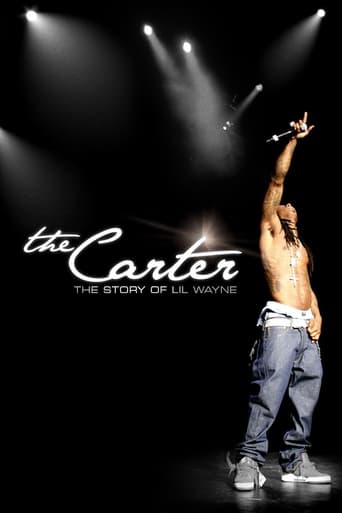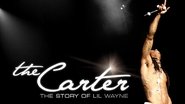Steve Pulaski
The Carter opens with Lil Wayne in his lavish home, working at his table when he aimlessly wanders over to his couch right in front of his TV. The TV is airing some random show and Wayne quickly takes note that one of the show's characters is wearing a shirt with his face on it and boasting the caption "BEST RAPPER ALIVE." Wayne is humbled, almost awestruck. "That's my name on that m***********," he tells one of his associates.This is one of the many, many reasons why Lil Wayne is one of the most charismatic and captivating artists of our generation. His ability to be boastful one minute, humble the next, and a crazy genius nearly all the time is precisely his attraction as an artist. His cocky, assured swagger isn't only present in his music, but in his interviews, many of which he'll stop halfway, as seen in this documentary, if he doesn't like the interviewer or their questions. This "short-fuse" nature he brings to the table is also evident when we are told in the beginning of the documentary that Wayne withdrew his support from the film halfway through and then tried to sue to prevent it from seeing the light of day.The funny thing about that is The Carter is not a disrespectful film; it's decidedly impressionistic, following Lil Wayne during the most successful time in his career which was before, during, and after the release of his sixth album Tha Carter III. Following monstrous success with the album's many singles - the infectious "Lollipop," with the late Static Major, the rowdy and briskly paced "A Milli," and the crazy "Get Money" featuring the likes of T-Pain - Tha Carter III went on to go platinum in one week, eventually earning that accolade twice more from the RIAA to cap out at over 3.6 million albums sold.The Carter shows him at the height of his game and during one of his most tumultuous stints in pop culture. This was a time when Wayne's weed and purple drank (a famous concoction amongst rappers including promethazine/codeine cough syrup, Sprite, and a Jolly Rancher) use was just as out of control as his public persona. Journalists and rap fans were, in a way, waiting for Wayne to kill himself with the famous beverage like rapper Pimp C did just a year prior, and all eyes were on Wayne, his music, and his unique character. Shot like a Frederick Wiseman documentary, with no interviews and an emphasis on situations instead of talking heads, The Carter has Wayne in numerous scenes, rapping, freestyling, preparing for a concert, or sipping his beloved purple drank. In one scene, Wayne opens a suitcase filled with supplies he uses in emergencies and one of the items, placed precariously next to about perhaps $100,000 in cash money, is a large bottle of Vitamin Water, however, its contents are deceiving. Wayne swishes the liquid in the bottle around, so we can see its thickness, "s*** ain't no Vitamin Water," he says with a smile.The thing about Wayne's music is even his weaker songs have brights spots, specifically Wayne's outlandish metaphors and one-liners ("we pop 'em like Orville Redenbacher," ""I peel off in the Lamborghine like a tangerine. Got the industry straight shaking' like a tambourine," and so forth). He's even more fun to watch perform; consider the scene when he gives a ribald performance of his song "A Milli," whilst shaking his dreadlocks, rolling on the floor, and almost break dancing in front of an energized crowd. This comes minutes after he was sipping drank and purring the lines, "I'm getting' nervous" in front of his affiliates and saying a prayer for his fans and themselves.Wayne's dualities make him such a fascinating character, worthy of a documentary that could've been twice the length of the seventy-five minute Carter. Even his songwriting methods are intriguing, largely because they are nonexistent. Wayne doesn't believe in writing down anything in journals or notebooks because that is evidence that could either be sold or distributed (his Carter III album was already leaked eight days before its release). With this practice, all Wayne's benign thoughts and quirky lyricism remain in his head, and it's a tellingly bold way to write, given how elaborate, layered, and sometimes breakneck fast Wayne songs can be.The Carter could've even kept going past Wayne basking in the fame and the success Tha Carter III brought by focusing on production of Wayne's seventh album, the frequently mocked and critically panned Rebirth. Rebirth was a turning point for Wayne because it was his rock album, where he placed strong emphasis on raucous heavy metal instrumentals, loud guitar riffs, and a brazen change in direction. Coming off of 2008's bestselling album, Wayne had made yet another questionable move that may have resulted in a complete change in perspective (Wayne's mainstream status began to falter with the singles of Rebirth failing to assert themselves the same way "Lollipop" and "Get Money" did and a subsequent prison sentence for the artist about a year later resulted in less publicity centered around music). While Rebirth may not be an amazing album, I've found that it's a true testament to Wayne's complete craziness and unpredictability as an artist, though I do not challenge anyone who claims to hate it. The few recording sessions of the album we get to see in The Carter are a real treat, though, no matter which way you slice it.The Carter is a beautifully low-key documentary on rap's biggest rock star and renaissance man, a soul who cannot be matched as far as being an intoxicating (and largely intoxicated) presence.
Niklas Pivic
In essence, I think Lil' Wayne is a genius. And an idiot. And by mixing those two elements - sadly by drinking a lot of cough syrup and smoking a lot of weed - Wayne claims to have recorded over a thousand songs, dabbles in all types of genres, his home has been raided by the FBI because of charges that his record company made, he's released mix-tapes into the Internet and made his record label furious... The list goes on. And his music, as this documentary makes clear from the start, does really say all about his life. What's really remarkable about him is that he mostly doesn't care about what other people think, and tries to break out from himself. He goes beyond rap. At the same time, he's entwined with all the stereotypes that make rap what it is; by no coincidence does he state that he never drinks, only to in the next sentence say "Only a champagne now and then", true to all the stereotypes that follow Baby and Cash Money Millionaires. All in all: inspirational, tragic and genial. Definitely worth seeing, and be sure, Wayne will prevail.
m thingmaker
I was completely unfamiliar with Lil Wayne's rap music before I watched this movie. While I can't say that I am a newly converted fan, I feel that he is undoubtedly an artist in the truest sense. He exists in his own world, makes his art pretty much for himself because he has to, and is utterly dedicated to his art, whether or not anyone else considers it art. The fact that he is a commercial success is just cake. This guy could be doing any other sort of art and be the same person as far as I can tell. He reminds me of another great unique artist, Syd Barrett. I have no idea how harmful his Syzzurup is, I just hope it doesn't kill him and leave the world with another brilliant casualty. He is definitely an "out there", bizarre person, and who knows what he'd be doing if he didn't find a creative outlet. I find him completely fascinating and I was moved by at least a couple of his pieces. I don't care for the p***y and drugs stuff, and I don't know that he really does either, but he sure knows how to apply them to his art. The guy is just a bottomless creative force, and I think it's great that he has an audience. I will definitely try to stay informed about his career.
Sundance Girl
Adam Bhala Lough is a director who's all flash with no substance. I thought "Bomb The System" was empty chop chop chop unoriginal stuff. Now here he is with The Carter and once again the movie is all style, no center. Hip-hop is a culture and music that needs originality, or it will die. Lil' Wayne has brought a little bit of originality to the game in the last couple years. But Bhala Lough can't match him, so what we get is MTV style visuals, making the film feel dated and tired. There's no risk taking and in the end the movie feels deflated, as opposed to energized. I kept waiting for the movie to take a breath and do some thing original, but it never did. I think Bhala Lough would be great in Hollywood making movies like Brett Ratner. He's the next Brett Ratner.





